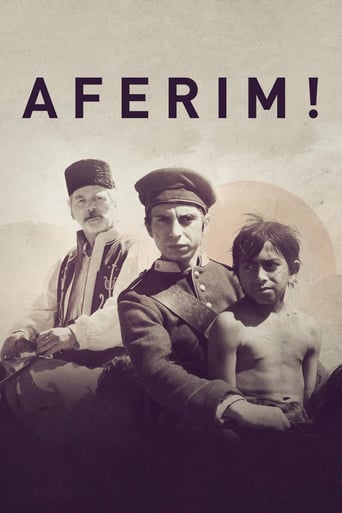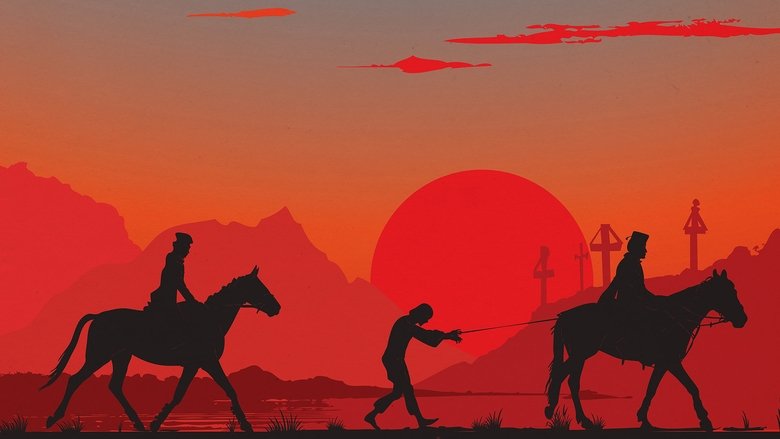Set in early 19th century Wallachia, Romania, a policeman, Costandin, is hired by a nobleman to find a Gypsy slave who has run away from his estate after having an affair with his wife.


Similar titles
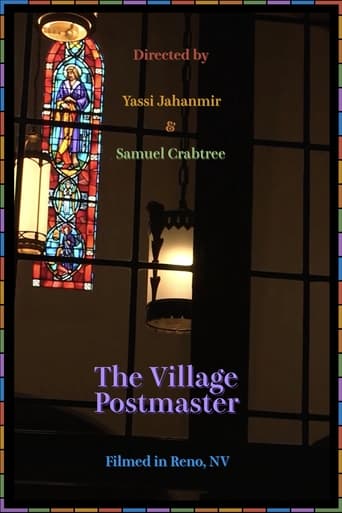
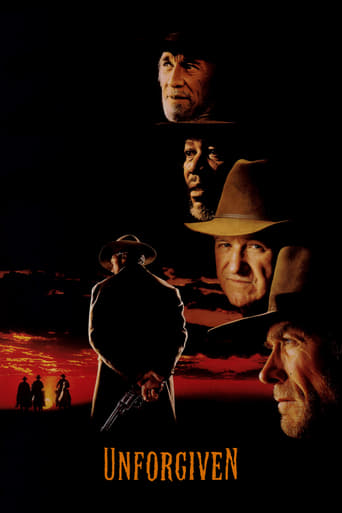



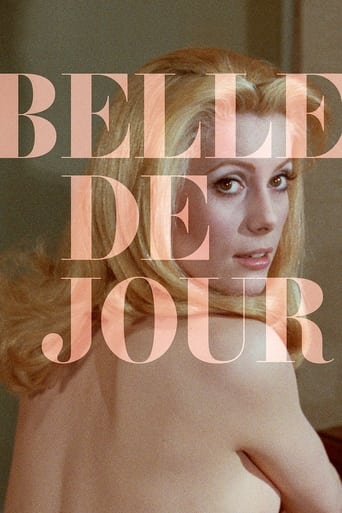
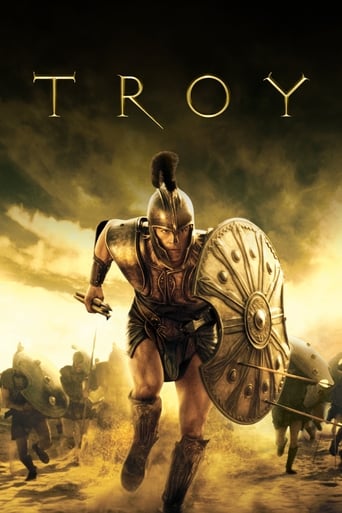
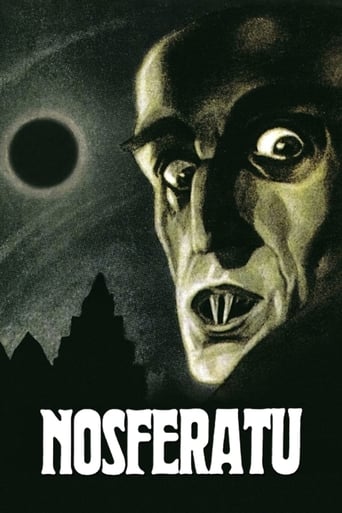
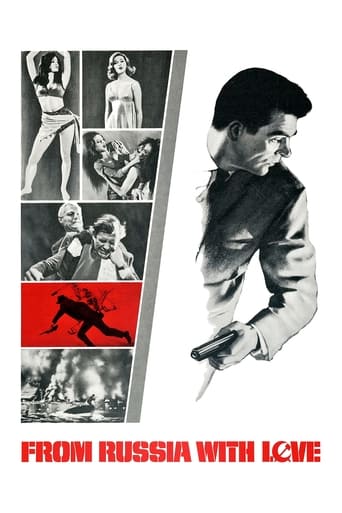

Reviews
Aferim! (2016) is sharply funny and uniquely crafted. Usually in a historical movie such as this one you would see a celebration of a certain culture. However, that is totally not the case here. Rather than being traditionally celebratory, the story presented shows how immoral the world used to be. I really loved how telling the story was, while at the same time being incredibly humorous. I also loved how confined yet vast the entire world felt. There were still several moments where I was absolutely bored. I can't say that I was entirely invested throughout the entire duration of the film. Yet there were still scenes which made this movie completely entertaining to watch. Going back to the story: I found that to be the overall best part of the film. Something about it felt completely distinctive and uncommon. The languages used are probably a key factor in helping to create that feeling. 'Aferim!' is charming as a whole, but boring in parts.
Great historical ode about Romanian people and other ethnicities that could have been found in early 19th century Romania. Aferim! explores some essential questions and subjects about life, religion and relationships between human beings, with the consciousness and mind typical for the man of that time. Also, there were a lot of films this year with great cinematography but Aferim! takes my vote in that department. I think the best yet simplest description for this film would be "Romanian Andrei Rublev". Another jewel in European filmography but before all enormously important film for Romania, from cultural and historical aspects.
If we had to give into the tradition of selecting the best movie of the year, I would undoubtedly select "Aferim!" for 2015. What strikes first is the quality of the image, an elaborate black and white with subtle tones of grey, very sharp texture and dramatic grades of shadow and light. This creates an aesthetical contrast with the grim atmosphere and living conditions depicted.It is the story of a manhunt in 19th century Romania, where a policeman (actually a mercenary hired by the boyar, a local noble) and his son chase a Gypsy to bring him back to the boyar. (Note: I will use the term "Gypsy" and not "Roma" to avoid confusion.)*** WARNING: CONTAINS SPOILERS ***One of the strengths of the movie is its successful combination of genres and styles.HISTORICAL. "Aferim!" very realistically depicts the life of the region at that time and notably Gypsy slavery which lasted until mid-19th century (a very rare topic in cinema). There is a strong historical research behind the movie. The structure of society is extremely pyramidal, with the boyar at the top, then his henchmen, then poor peasants, and at the bottom Gipsies. Women always are a level lower than men (wife, daughter, prostitute). There is no law: the boyar is the law, he decides what happens on his territory and hires mercenaries to have it mercilessly applied. We understand this happens on all territories. It is a reign of terror: if the policeman fails he will be severely punished. This is why we cannot fully blame the latter for what he is doing: he is brutal, but he is constrained by a system and his ignorance. Ironically, the title "Aferim" (highlighted by an exclamation mark) means "Bravo" in Ottoman Turkish, but we wonder what one could say bravo about in that society (characters use this word in the movie, since the region was for a long time part of the Ottoman empire). Important side note: it is not a movie bashing Romanian history since it has universal reach; the same barbarity happened elsewhere at different periods, including today.MORAL. The movie addresses many topics, the main ones being oppression and intolerance. There is widespread racism (against Gipsies mostly), anti-Semitism and xenophobia notably against Turks. Interestingly, this hatred is most virulently expressed by a priest (pope in Orthodox religion), in contradiction with the tolerant message of Christ: it shows how widespread these feelings were at the time. The policeman is also strongly prejudiced against these communities, and throws in some misogyny and homophobia for good measure; nevertheless he is persuaded to be on the right side of the law and ethics. Ironically, the Gypsy he is chasing, who for him represents evil, turns out to be friendly, more instructed and moral than he is. Another important topic is justice: at the beginning of the story we think the Gypsy did something terrible to justify such a chase, but it is only adultery; at the end, the punishment is completely disproportionate. We also witness poverty, corruption (the policeman searches for bribes and bribes a colleague), superstition mixed with religious beliefs, education, sexuality, etc. As the director highlighted, many of these themes refer to the present world.WESTERN. The director admits being inspired by old Westerns which partly explains the choice of black and white film: a policeman on a horse, a manhunt, suspense, the theme of good vs evil which actually turns out to be complex, different encounters on the road. It also is an initiation story, as some Westerns are: the son is being trained by his father to become a man, according to his beliefs.PICARESQUE. The movie resurrects the tradition of picaresque novels: main character as anti-hero, succession of small and big adventures, meeting of varied and strong characters, realism, satire, pessimism, pseudo-philosophical speeches, etc. However, it goes further down the road of crudity and cruelty.FANTASY. The movie sometimes drifts to unreal scenes, for instance when the policeman and his son in a dark forest are almost run over by a mysterious carriage going full speed. Or when they discover bodies following a massacre they don't understand. Encounters feel at the same time real and dreamlike: a lonely priest, an illegal fisherman, a wealthy traveller, etc. This reinforces the absurdity and arbitrariness of the world depicted. One of the most successful scenes is the frenetic party at the inn, where alcohol brings all men and women together. In this noisy climax the characters show a more human side, although a simple, vulgar one. We feel people could be happy if oppression were not dominant. But the following morning life goes on as before.In summary, "Aferim!" is compelling, ironical, sometimes humorous and mostly harsh (be warned: the end is extremely violent). The movie efficiently mixes tones: we are sometimes amused, sometimes appalled by characters and situations. Photography and acting are especially impressive. Pace is fully mastered: not too slow to be intriguing, not too fast to be realistic and provide breathing space. Aferim to all the artists who gave us this grand film.
It is 1835. Constandin and his son are searching for a runaway slave, to be returned to his owner for a reward. Constandin is the local constable and during the journey he is trying to teach his naive, uninterested son what his job entails. Constandin is the protagonist of the piece, and the story is told through his eyes and he is in nearly every scene. His character is the most developed and I felt the son and the slave's personae could have used some padding out. I have never been to Romania and know little of its history. We find that prejudice and racism are endemic in the country at this time, as well as abject poverty and blind ignorance. The screenplay is shot through with these traits and in many ways mirrors the U.S. around the same period. The slave in question is a Gypsy, who apparently were a despised minority and subject to the same indignity and humiliation as minorities in our country were. If we are to believe the screenplay, there was a distinct lack of national moral character and ethical bankruptcy rife in Romania at this time. Constandin, who is the most upright individual we encounter in the film, trying to make a man of his young son, stuns us and hires a whore for him at an overnight stop. He congratulates his son afterwards and continues to impart some of his unique wisdom and worldliness as they continue their travels. Earlier, they come across an Orthodox priest who delivers a comical rant containing all the bigotry and prejudice he can muster, omitting no ethnic group. Do such deeply-held sentiments and moral lapses continue in present-day Romania? The film was shot in black-and-white, although the poster on the website is in color, and is billed as a comedy/western/drama. The latter categories fit better, as there is very little humor to be found. I appreciated the photography which as a reviewer mentioned gives it an authentic look. But "Aferim!" is a bleak and depressing film and ends on a very downbeat note. As such, it does not fall under my definition of entertainment, and I can only recommend it on the basis of its technical accomplishments.
